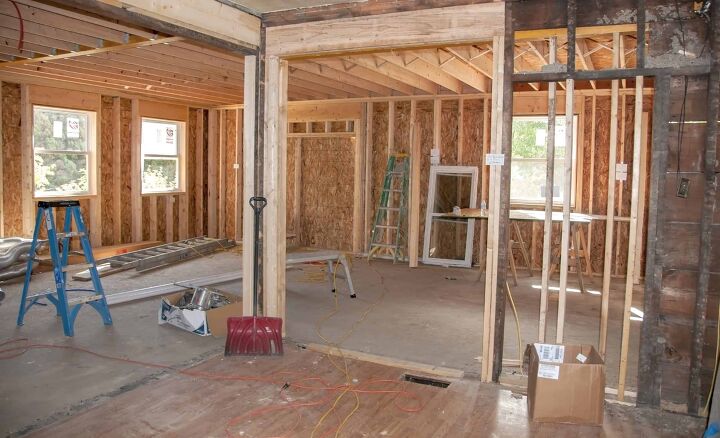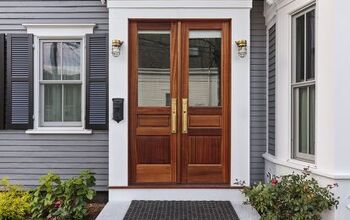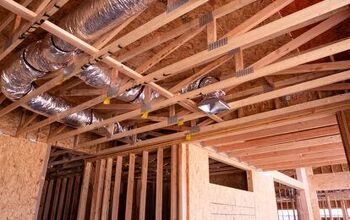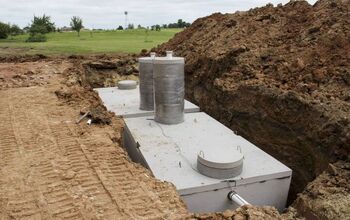What Happens If You Get Caught Remodeling Without A Permit?

Many people decide to renovate their home either to bring it up to modern living standards or in preparation to sell. Maybe you’re thinking about remodeling a kitchen or finishing the basement.
What many don’t realize is that you need to get a permit before you can start remodeling. Despite this, there are some that skip this step. If you aren’t planning on selling your house, it might not be a big deal.
But if you ever try to sell your house, you will need to show that you have the proper permits to have implemented those renovations. It could wind up voiding an appraisal, an essential step in the selling process.
Do You Need an Addition or Remodel Contractor?
Get free, zero-commitment quotes from pro contractors near you.

What Happens If You Remodel Without A Permit?
Even though there may be a chance that you don’t get found out, there are definitely consequences of not getting a proper permit. A lot of people skip permits because they feel like no one will ever find out about the work they’ve done on their home.
Safety Concerns When Skipping A Permit
The first consequence is safety. When you skip out on a permit there are no guarantees of safety. And let’s face facts: most people performing renovations aren’t certified contractors with years of experience under their belts. They are people looking to save costs on construction and labor.
Getting a permit means getting a certified inspector to verify that the work being done is compliant with building codes and safety standards.
While all of this may seem like a pain, you won’t have to worry about things going wrong or breaking down; the inspector will verify that the materials are also up to current standards.
Resale Value Goes Down If You Renovate With No Permit
Perhaps the biggest issue with performing renovations without a permit is when it comes time to sell the home. Even if no one has any idea that the renovations were performed without a permit, it will come back to bite you when it comes time to sell.
During most standard sales, you will need to prove that there was a permit for those renovations. Most buyers will end up walking away from a house that has had renovations done without a permit. This is because there is no guarantee that the renovations were performed safely or correctly.
Even if the buyer doesn’t end up walking away, they may require the situation to be remedied or they may simply put in a lowball offer. No matter what they do, you have no recourse because, without that permit, you can’t get a proper appraisal.
In the end, it will cost you quite a bit more money than paying for the permit if you plan on selling your home.
Will No Permit Affect Insurance?
Even the safest of renovations are susceptible to issues. Things like burst pipes can happen due to a number of factors. If your new bathroom winds up flooding your home, for instance, insurance may not cover the damages due to the unpermitted work.
Likewise, if you have someone visit and they injure themselves, your homeowner’s policy is unlikely to cover the liability presented to you. While these are rare occurrences, they can result in major costs and liability in the end.
You Might Have Trouble Securing A Loan
Maybe you don’t ever plan to sell your home. This makes it okay to perform renovations without a permit, right? Think again. Should you ever want to refinance your home, guess what you’ll need? An appraisal.
And as we covered above, no appraiser is going to assess home renovations done without a permit.
Not only would you not be able to get a loan for your home, but the bank may also turn you down entirely. On the flip side, if you end up buying a home that has unpermitted work and the lender finds out after the fact, you may be required to immediately repay the loan. It doesn’t happen, but it is a doomsday scenario when it does happen.
What Are The Penalties If You Renovate Without A Permit?
Maybe you don’t need to sell your house, you aren’t in need of a loan, and you have a solid structure even if you can’t prove that the company you hired didn’t cut corners on materials. Even if you feel like you have all the money in the world and it will never be found out, the other shoe will drop.
But if the city finds out, you won’t be so lucky. It could come during an annual property tax assessment. It could be an angry neighbor who is bothered with your renovation for whatever reason.
In the end, if the city finds out, it’s going to cost you.
And oh boy is it going to cost you. It all depends on the city that you live in, but there are some cities that will charge you $500 per day until you acquire the right permits.
Even if you think you’ll never be found out, something will likely lead you to being found out. Safer than sorry, that’s what they always say.
Renovating Without A Permit Is A Waste Of Time
Sure, it can take some time to get the permit and have a proper inspection performed. Even if you’re in a hurry to get the work done, think about the fact that it will cost you a lot more time and money if the city stops your construction or has you tear down work you’ve already done.
At the end of the day, performing renovations without the proper permits can and will wind up costing you time and money.
How much time and money you spend is up to you, but it is advisable that all the proper permits be obtained before the construction process begins.
What Happens If You Buy A Home That Had Unpermitted Renovations?
This is a stroke of bad luck on your part. Contact the permitting authority in your city and see if they will retroactively permit the renovations done.
Keep in mind that it might require the hiring of an architect, opening up the walls, or even demolishing that part of the home. And unfortunate as it may seem, as the owner of the home, you are responsible for any of the fines incurred.
If the seller didn’t disclose the unpermitted work and you suffered damages trying to fix the situation, there’s potential that you could take them to civil court over the costs. In any event, do not put off fixing the situation.
Statute Of Limitations
Some states have a statute of limitations for how long after the fact that you can potentially file a suit. In most states, it’s two years. In others, it can be up to three years.
Whatever the case, it is of the utmost importance to have proper permits for any work done. This is why having an appraisal done is so important when buying as well. Permits might seem like a waste of time and money, but they will actually save you quite a bit of both in the long-run.
What If You Are In The Process Of Buying A Home And Find Out It Had Unpermitted Work?
Fortunately, in this case, you discovered this before you sealed the deal. Depending on the real estate market, this may actually give you major advantage. The simplest solution is to just walk away from the deal once your inspection reveals unpermitted work.
However, if you’re still set on buying the home, the price is right, and the work was relatively minor, you have two options:
- Accept the house as-is, but ask for a lower price.
- Ask the seller to obtain the proper permits prior to closing on the house.
If you decide to purchase the home as-is, it’s important to understand that you will be taking on all of the potential fines, fees, and aggravation of the unpermitted work yourself. Also, you must disclose the unpermitted work when you decide to sell the home one day. This can significantly lower the value and asking price of the home.
Do I Need A Permit For Small Remodeling Projects?
If you’re wondering whether or not your remodeling project requires a permit, chances are that it does. However, always check with your local building or permitting department. In some cases, they make exceptions for minor projects.
For example, if you live in Seattle, here are the guidelines established by their Department of Construction and Inspections:
- Minor repairs or alterations: A permit is not required for minor repairs or alterations that cost $6,000 or less in any six-month period. The $6,000 amount is based on fair market value for parts and labor, even if the work is done as a DIY project.
- With that said, you do need a permit for any work that is performed on load-bearing supports, work that reduces egress, ventilation, fire resistance, light, or changes the building envelope, regardless of how small the project is.
It’s important to keep in mind that while you may not need a building permit for your small remodeling project, you may still need another type of permit – such as an electrical or plumbing permit.
Since there is often exceptions to the rules, always give your local building department a call fist to make sure that you have a proper understanding of whether or not you need a permit, based on your project and where you live.
What If My Contactor Says I Don’t Need A Permit?
Most reliable contractors and remodeling companies will be honest with you about the permits required by law for your particular project. In fact, it is in their best interest to follow the rules to avoid getting fined, losing their license, or even shut down.
With that said, there are some shady companies out there that may offer to do unpermitted work. As the homeowner, you should take the time to determine whether or not the remodeling work requires a permit. That way, if you know that a permit is required and the company you hired is willing to continue without one, you may want to go with a different remodeler.
Any offer to do unpermitted work is a major red flag. In these instances, you should strongly consider seeking out a more reputable contractor.
What if I am selling my home that had unpermitted remodeling work?
Your realtor will ask you to fill out a disclosure form when you list your home. Answer all of the questions truthfully. You risk destroying any possible agreement and exposing yourself to civil claims if you don’t.
- Declare on the form if you completed any renovation work without a permit. If you know about any such work done by past owners, include it on the form. If you honestly don’t know if previous work was done with or without a permit, say “don’t know.”
- Confirm with your real estate agent or attorney, but you aren’t obligated to go sleuthing for past permits infractions that you aren’t already aware of in most circumstances. These will most certainly be discovered by the buyer’s home inspector or bank appraisal and reported to the buyer.
What Types Of Renovations Require A Permit?
Local building codes play a big role in whether or not you require a building permit for your home improvement project. To learn more about your city’s building permit requirements, go to its office or website. Climate, topography, and population are examples of regional issues that are generally reflected in codes.
Permits are frequently required for remodeling projects that could result in harmful working conditions. Projects of this nature include:
- Plumbing and electrical installations and replacements
- Demolition of a portion of your home
- Walls are added or removed.
- Converting a room
- Pipes need to be updated or repaired.
- Redoing the roof
- Heating repair or replacement
If the project necessitates structural, electrical, mechanical, or plumbing upgrades, you’ll need a permit. Permit information is frequently available on city websites. Any remodeling project costing more than $5000 will almost always necessitate a permit.
Projects That Do Not Require A Permit
Fortunately, not all house improvements necessitate obtaining a permit. The following are examples of projects that do not require a permit:
- Putting up a new fence
- Improvements to the landscaping
- Driveways and walkways repaving
- Appliance replacement
- Putting in new flooring
- Painting
- Cabinet additions or replacements
A permit is usually not required for cosmetic changes to your home. It’s best to check with your local authorities to be 100% sure when you do and do not need a permit.
What Is The Reason For Permits?
The most important reason for permits is for safety. Applying for a permit isn’t simply getting permission to perform renovations or to build an add-on. Permits also mean getting an inspector involved to ensure that everything is done correctly.
The permit will include a review of your design and the inspector will check on the project to ensure that safety is factored in during the construction.
If you’ve brought in a contractor, the safety inspections will ensure that they aren’t cutting corners or skimping on the proper materials. Not only that the inspector will make sure they are compliant with any local building codes.
Is It Worth It To Get A Permit Instead Of Remodeling Without One?
Though they may be a nuisance to get – it is an added expense and getting the permit can take a while to get – it is well worth the trouble. Those operating on a budget may not look forward to the additional expense or time spent.
At the end of the day, however, it provides serious relief and peace of mind. Knowing that you have the proper safety measures in place can allow you to enjoy the new renovations without having to worry that the job was done properly.
Do You Need an Addition or Remodel Contractor?
Get free, zero-commitment quotes from pro contractors near you.

Final Thoughts
In short, if you’re worried about what happens if you get caught remodeling without the proper permit, you should probably just get one. After all, nobody enjoys dealing with extra paperwork or having to pay more money.
Getting a permit for your remodeling job means giving up less than an hour of your life to avoid having to pay hundreds of dollars in fines, risking the safety of your family, disrupting the resale value of your home, facing complications with getting a loan, and wasting a lot of time in the process.

Ryan Womeldorf has more than a decade of experience writing. He loves to blog about construction, plumbing, and other home topics. Ryan also loves hockey and a lifelong Buffalo sports fan.
More by Ryan Womeldorf



























